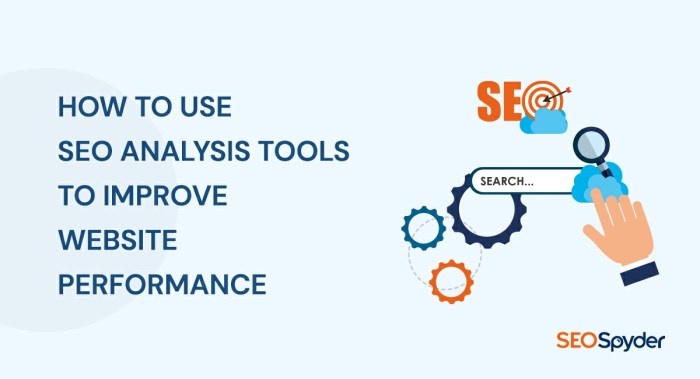Using SEO Analytics Tools – Kicking off with Using Analytics Tools, this paragraph dives into the world of analysis, shedding light on how these tools can revolutionize website performance. From tracking key metrics to making data-driven decisions, get ready to explore the power of analytics tools.
Introduction to Analytics Tools

analytics tools are essential for any website looking to improve its online visibility and performance. These tools provide valuable insights into the website’s traffic, user behavior, rankings, and more. By analyzing this data, website owners and digital marketers can make informed decisions to optimize their strategy and drive more organic traffic to their site.
How Analytics Tools Improve Website Performance
analytics tools help in improving website performance by:
- Identifying top-performing s: By analyzing rankings and search volume, website owners can focus on optimizing content around high-performing s to attract more organic traffic.
- Monitoring website traffic: These tools provide detailed insights into website traffic sources, user demographics, and behavior, helping website owners understand their audience better and tailor their content accordingly.
- Tracking backlinks: analytics tools help in monitoring backlinks to the website, allowing website owners to identify quality backlinks and build a strong link profile for improved search engine rankings.
Importance of Data-Driven Decisions in Strategy
Making data-driven decisions in strategy is crucial because:
- It allows website owners to track the effectiveness of their efforts and make necessary adjustments to improve performance.
- By analyzing data from analytics tools, website owners can identify trends, patterns, and areas for improvement to stay ahead of the competition.
- Data-driven decisions help in setting realistic goals and measuring the success of campaigns accurately, leading to better ROI and long-term success.
Types of Analytics Tools
When it comes to analytics tools, there are various types available to help you analyze and improve your website’s performance. These tools can provide valuable insights into your website’s traffic, s, backlinks, and more. Let’s take a look at some of the main types of analytics tools and how they can benefit your digital marketing strategy.
On-Page Tools
On-page tools focus on optimizing individual web pages to improve search engine rankings and drive organic traffic. These tools help you analyze elements such as meta tags, headings, density, and content quality. Examples of popular on-page tools include Moz’s On-Page Grader and Yoast plugin for WordPress.
Off-Page Tools
Off-page tools are designed to monitor and analyze external factors that influence your website’s search engine rankings. These tools track backlinks, social signals, and brand mentions across the web. Ahrefs and SEMrush are well-known tools for off-page analysis.
Research Tools
research tools help you identify the most relevant and high-performing s for your content. These tools provide data on search volume, competition, and trends. Google Planner, SEMrush, and Ahrefs s Explorer are popular choices for research.
Competitor Analysis Tools
Competitor analysis tools allow you to spy on your competitors’ strategies and performance. These tools help you identify opportunities and gaps in your own strategy by analyzing your competitors’ s, backlinks, and content strategies. Examples include SEMrush, Ahrefs, and SpyFu.
Technical Tools
Technical tools focus on optimizing your website’s technical aspects to improve search engine crawling and indexing. These tools analyze factors like site speed, mobile-friendliness, and structured data markup. Google Search Console and Screaming Frog are commonly used tools for technical analysis.
Free vs. Paid Tools
Free tools typically offer basic features and limited data access, while paid tools provide more advanced analytics and comprehensive reports. While free tools like Google Analytics and Google Search Console are great for beginners, paid tools like SEMrush, Ahrefs, and Moz Pro offer in-depth insights and competitive analysis.
Popular Analytics Tools
– Google Analytics: Provides detailed insights into website traffic, user behavior, and conversions.
– SEMrush: Offers research, backlink analysis, and competitor tracking features.
– Ahrefs: Known for its comprehensive backlink analysis and research capabilities.
– Moz Pro: Provides audit, research, and rank tracking tools.
Key Metrics to Track with Analytics Tools: Using SEO Analytics Tools
Tracking key metrics using analytics tools is crucial for understanding the performance of your website and optimizing your efforts. By monitoring important metrics like organic traffic, bounce rate, and conversion rates, you can gain valuable insights into the effectiveness of your strategies and make informed decisions to improve your website’s visibility and performance.
Organic Traffic, Using SEO Analytics Tools
Organic traffic refers to the number of visitors who land on your website through organic search results. This metric is essential as it shows how well your website is ranking on search engines and how successful your efforts are in driving traffic to your site. By tracking organic traffic, you can identify which s are driving the most traffic, assess the impact of your content and optimization strategies, and make necessary adjustments to improve your search engine visibility.
Bounce Rate
The bounce rate measures the percentage of visitors who navigate away from your website after viewing only one page. A high bounce rate can indicate that visitors are not finding what they are looking for or that your website is not user-friendly. By tracking the bounce rate, you can identify pages that are not engaging visitors, assess the quality of your content and user experience, and implement changes to reduce bounce rates and improve visitor retention.
Conversion Rates
Conversion rates measure the percentage of visitors who complete a desired action on your website, such as making a purchase, signing up for a newsletter, or filling out a contact form. Tracking conversion rates is crucial for evaluating the effectiveness of your strategies in driving valuable actions on your site. By analyzing conversion rates, you can identify high-performing pages, optimize your calls-to-action, and tailor your content to better meet the needs of your target audience, ultimately improving the ROI of your efforts.
Utilizing Data from Analytics Tools

When it comes to utilizing data from analytics tools, the key is to interpret and analyze the information to make informed decisions that can enhance your performance. By understanding the data provided, you can identify trends, track progress, and make adjustments to your strategies for better results.
Interpreting and Analyzing Data
Before diving into the data, it’s important to have a clear understanding of the key metrics you are tracking and what they indicate about your website’s performance. Look for patterns, anomalies, and correlations that can help you identify areas for improvement.
- Utilize tools like Google Analytics to track website traffic, user behavior, and conversions. Analyze this data to see which pages are performing well and which ones need optimization.
- Monitor rankings and organic search traffic to understand how your efforts are impacting your visibility in search results.
- Pay attention to bounce rates, time on page, and other engagement metrics to assess the quality of your website content and user experience.
Using Insights to Make Informed Decisions
Once you have analyzed the data from analytics tools, it’s time to use the insights gained to make informed decisions that can drive your strategy forward. By making data-driven decisions, you can prioritize tasks, allocate resources effectively, and optimize your website for better performance.
- Identify high-performing s and optimize your content to rank higher in search results for those terms.
- Address technical issues on your website that may be affecting your performance, such as page speed, mobile-friendliness, or broken links.
- Adjust your content strategy based on user engagement data to create more relevant and valuable content for your audience.
Improving Performance with Analytics Data
By leveraging the data from analytics tools, you can continuously improve your performance and achieve better results over time. Use the data to refine your strategies, track progress, and adapt to changes in search engine algorithms and user behavior.
- Regularly review and analyze your analytics data to identify new opportunities and areas for improvement.
- Experiment with different strategies based on the insights gained from analytics tools to see what works best for your website.
- Monitor the impact of your efforts on key metrics and adjust your tactics accordingly to achieve your goals.
